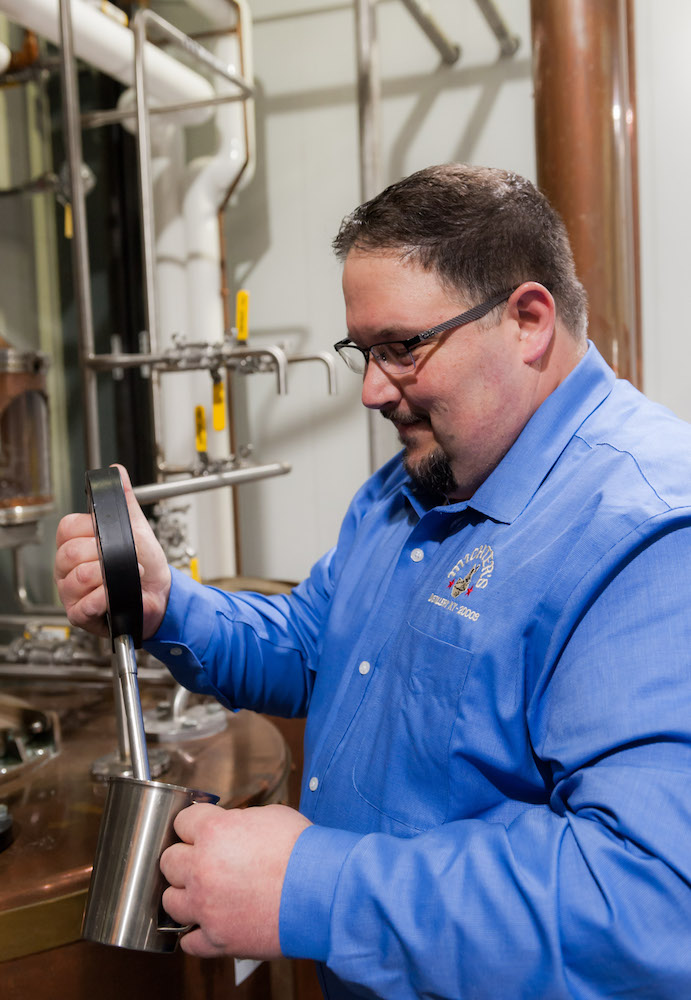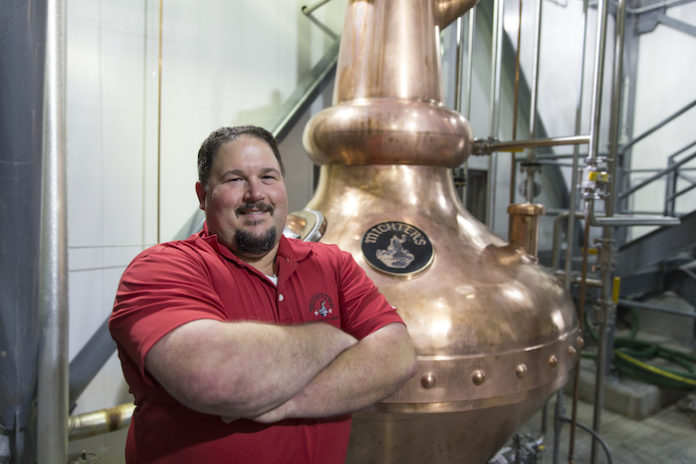Dan McKee has big shoes to fill.
In April he received promotion to Master Distiller at Michter’s Distillery in Louisville, following the retirement of one of his mentors, former Master Distiller Pamela Heilmann. Heilmann set precedent for women leaders in whiskey distilling, and had a reputation for her old-school work ethic and unflinching commitment to quality.
McKee first worked under Heilmann at Booker Noe Distillery, and then followed her to Michter’s. Having learned from her and other industry greats in various ascending distillery roles (including his start at Jim Beam), McKee now moves up to Master Distiller with a wealth of industry experience. We recently caught up with McKee to talk whiskey and what’s next for Michter’s, as he takes over the production reigns for this global brand.
Kyle Swartz: How’s the new position, and what’s it like following someone like Pam?
Dan McKee: I still talk to her every week. She’s still really involved in everything. [Heilmann became Master Distiller Emerita upon stepping down as Master Distiller.]
It’s very exciting. I’m very happy to be given this opportunity. Every day is a new day to learn. I’m still young in the career; I haven’t seen everything. I have a great team around me that can really tackle a lot of things and be successful.
Working with Pam was a great experience. Pam is one of those people where if you put in the work, she’ll put in the work back with you. She’s old school, definitely. She was a great teacher and still is.
Starting out at Jim Beam, I have worked with people who have 10, 20, 30, 40 years of experience. I’m very fortunate.
Even before I became Master Distiller, Pam always involved me in so much of the discussions at Michter’s. That’s what I’m trying to do now with my team. Our distiller, Matt Bell, is very talented.
KS: So what’s next for Michter’s?
DM: We have some exciting releases coming in the last half of 2019. We’re coming off an excellent release in 2018 of our Shenk’s and Bomberger’s legacy brands. Those lines will continue to be vintage dated, and each year we will continue to experiment with the production.
We’re doing a lot of exciting things at our new Michter’s Fort Nelson Distillery in downtown Louisville, which has a pot still system from Pennsylvania Michter’s. At Michter’s Farm and Operations in Springfield, we’re starting to farm our own estate-grown grains, including corn, rye and barley. We’re really at the beginning stages of a lot of this, but we hope to someday distill using these grains at Fort Nelson. Once we get those three grains down, then we might explore growing different types of grains.
KS: When I think ‘Michter’s’, ‘consistency’ and ‘quality’ come to mind. Why are those such a focus for this brand?
DM: Experimenting is important, of course, but our number one factor here is maintaining a quality standard. We have always taken the stance that we are not a flavor-of-the-month brand, but a brand that is building longevity. We want to continue that quality while also bringing forward flavors and improving upon the product. We will never deviate from that quality portion of it.
It is important that we continue to innovate. We’re a privately held company, so we’re allowed to do things less efficiently if it will improve the quality.

And that also allows us to age to the taste profile, rather than to the age statement. We have the flexibility not to release product until it’s ready. All of our products are single barrel or small batch, which for us means 20 barrels. So with those parameters, we have to have that consistency.
And overall, it is truly is about quality these days in the whiskey industry. Quality above everything else. No matter what, people understand quality. They will always come back to quality, even over the ‘bright lights’ brands. We want to stay true to that at Michter’s.
It’s not like I want to take a left turn, and try something different than that. I want to take the success already established here and continue it forward.
KS: What’s your thought on age statements versus blends?
DM: So we have a 10-year-old age-statement bourbon and rye, but to this day, liquid in those bottles is almost always older than 10 years. There’s a lot of 12-to-14-year-old liquid in those bottles. Our philosophy is that we always put out the Michter’s house style that consumers know. Is that ten years plus one day? No, sometimes it’s 12 years. It all goes back to maintaining that Michter’s quality.
KS: Pam earlier this year told me that she thinks younger whiskey is tasting great in the current market. What are your thoughts?
DM: I think that comes along with how the industry has progressed over the years. The quality is up with new technologies, plus improved practices and knowledge. I think the whiskey industry as a whole has improved in quality as it moves forwards.
And it helps that consumers are very well educated these days, and provide a lot of impactful feedback. Then it’s up to the companies to adjust.
KS: So you’re in favor of today’s super-educated consumer?
DM: It adds to everything that we try to do here. Distilleries have been really good recently at opening up to the public and showing them that this is how we do it. So I don’t see anything negative about educated consumers — I only see positives.
KS: Michter’s is one of those brands with super-premium releases that end up on the secondary market for many times their original SRP. Do you have an opinion on this?
DM: Anyone who buys one of our bottles at those prices, it just makes me feel honored to be doing what we’re doing here. But I haven’t really been involved with the secondary market, other than knowing it exists.
KS: What advice would you give consumers who are new to the whiskey category?
DM: Try it neat, and then explore around and find out exactly how you like it. There is a lot of great whiskey out there — especially Michter’s.
Kyle Swartz is editor of Beverage Dynamics magazine. Reach him at kswartz@epgmediallc.com or on Twitter @kswartzz or Instagram @cheers_magazine. Read his recent piece, 11 Alcohol Trends to Watch in 2019-20.





[…] was really happy when we tasted these barrels,” says Master Distiller Dan McKee. “This release has so much of what I look for in a […]
[…] This continues the protocol set by our late Master Distiller Willie ‘Dr. No’ Pratt,” commented Michter’s Master Distiller Dan McKee. […]
[…] 10-year age statement, sometimes releasing juice that has been barrelled up to 14 years. In this 2019 interview McKee even stated that ‘the liquid in those bottles is almost always older than ten years’ […]